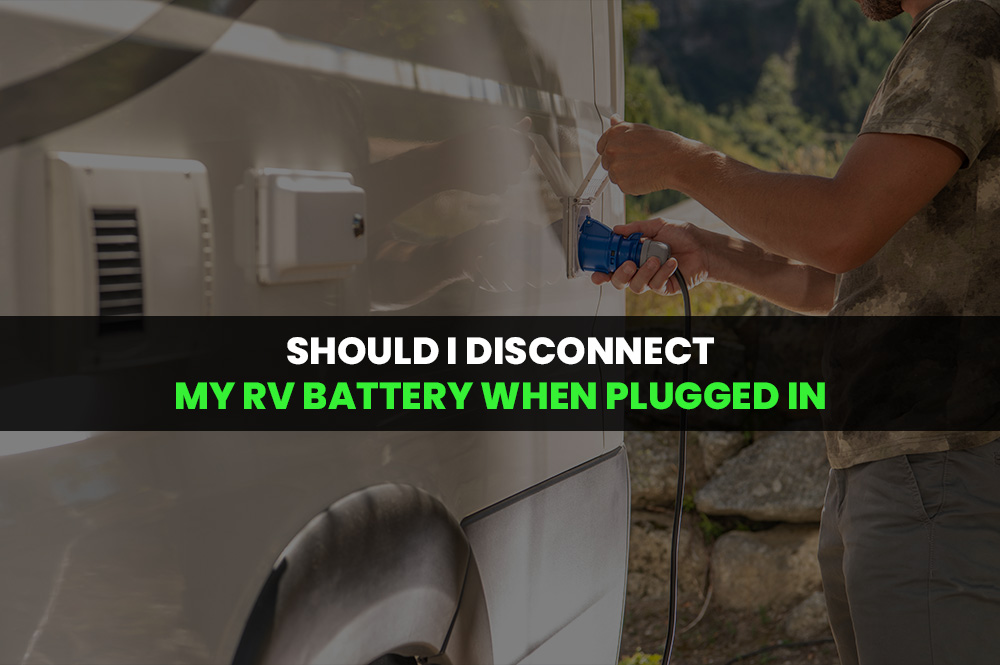Should I Disconnect My RV Battery When Plugged In

An RV battery, often referred to as a "house battery," powers the 12V DC systems in your RV. These systems include lights, 12V outlets, vent fans, slideouts, a water pump, and some appliances. The beauty of an RV battery lies in its ability to provide electricity even when you're off the grid, allowing you to camp in remote locations while enjoying modern conveniences.
What is Shore Power?
Shore power, on the other hand, involves accessing the 120V AC portion of your RV's electrical system. This external power source is typically available at RV parks or campgrounds through a power pedestal. Shore power enables the operation of power-hungry appliances like microwaves, air conditioners, and 120V power outlets. It's a convenient way to enjoy additional amenities when you're parked at a site with electrical hookups.
Role of the RV Converter
The RV converter plays a crucial role in this dynamic by converting 120V AC power to 12V DC power. This conversion is essential for running the 12V systems in your RV and, equally important, for charging the RV battery. The converter ensures that your battery stays charged when you're plugged into shore power, enabling you to utilize the 12V electrical system even when disconnected from external power sources.
Should I Disconnect My RV Battery When Plugged into Shore Power?
No, it's generally not necessary to disconnect your RV battery when plugged into shore power. Most RVs have a converter or inverter-charger that manages the charging process and provides power to the RV's electrical system. Disconnecting the battery may interrupt this process and affect the functioning of your RV's systems.
Some RVs and converters are designed to work without a battery in the system. The converter supplies 12V DC power to the RV's electrical system independently. However, for optimal functionality, especially if you want your battery to charge, it's advisable to keep it connected.
Also read: How to Charge RV Batteries
Exceptions to the Rule
While the general guideline is to keep your RV battery connected during shore power usage, there are exceptions:
Long-Term Storage: For extended periods of RV storage, exceeding a month, it might be prudent to disconnect the battery. This precaution is particularly relevant if your RV has an older or inefficient converter/charger that could overcharge the battery during storage.
No Shore Power Access: If you lack access to shore power to maintain the battery's charge while the RV is stored, disconnecting the battery is a sensible choice to prevent discharge.
Parasitic Drains: Some RV electronics experience parasitic drains, drawing a small amount of power even when turned off. If your battery disconnect switch doesn't halt all parasitic drains, disconnecting the battery at the terminals can prevent slow discharging.
Also read: How Long Do RV Batteries Last
Smart Charger Option
In situations where disconnecting the battery might not be ideal, using a separate smart charger offers an alternative. A smart charger can keep the battery charged without the risk of overcharging, providing a middle ground for those concerned about long-term storage or parasitic drains.
Advancements in RV Electrical Systems
As technology evolves, RV electrical systems continue to undergo advancements. Newer models may incorporate smarter converters and integrated battery management solutions, reducing the need for manual intervention. Keeping an eye on these innovations can provide insights into the future landscape of RV power management.
Conclusion
The decision to disconnect an RV battery or not when plugged into shore power depends on various factors. While the general rule favors keeping the battery connected for regular use, considerations for long-term storage, lack of shore power, or potential parasitic drains may warrant disconnection. Knowing your RV's electrical system, converter functionality, and the specific needs of your battery will empower you to make informed decisions for a seamless and efficient RV experience.
Also read: Signs That Your RV Battery Needs To Be Replaced
If you’re looking for a new RV battery, visit the Batteries Store in Calgary. We have a wide range of sizes and types of RV batteries for a variety of RV models. We have batteries for caravans, motorhomes, and travel trailers.